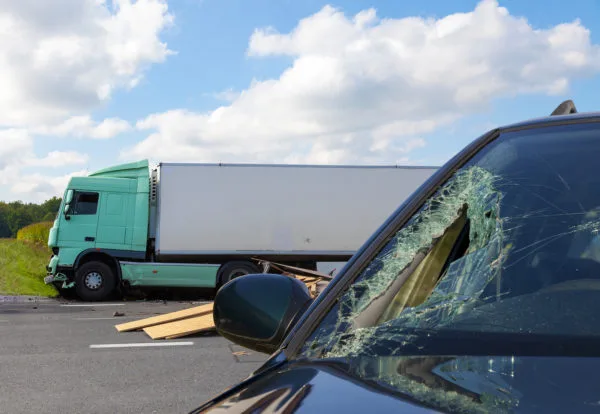Investigating a Truck Accident Requires Resources

According to 2017 data from the Federal Motor Carrier Safety Administration, 4,889 large trucks and buses were involved in fatal accidents in one year in the United States, and many more were involved in serious injury crashes. Due to their large size in comparison to other vehicles on the road, commercial truck accidents are often more serious than other types of crashes. Unfortunately, investigating a large truck accident for the purpose of filing a personal injury or wrongful death claim often requires more resources, as well. Here is a look at some of the things that go into the investigation of a commercial truck accident.
Proving Negligence
To achieve a successful outcome from a truck accident personal injury or wrongful death claim, the victim must prove negligence. Negligence is established by demonstrating the following elements:
- The driver owed other drivers on the road a duty of care.
- The driver’s duty of care was breached by his or her negligent actions.
- These actions resulted in specific damages to the victim.
While not all truck accidents are the fault of the commercial truck driver, some of the most common examples of negligence on the part of these drivers include:
- Fatigue: Fatigue became such a problem with commercial truck drivers that the Federal Motor Carrier Safety Administration passed hours of service regulations limiting the hours a truck driver can drive before he or she must take a break. According to information from the National Safety Council, fatigue when driving causes worsening reaction time, awareness, and ability to sustain attention. Surveys indicate that many drivers violate the hours of service regulations and work longer than permitted, perhaps because of unrealistic expectations on the part of trucking companies, increasing the likelihood of fatigued driving.
- Distracted driving: Commercial truck drivers face the same temptations as any other driver when it comes to distractions, including texting or talking on their phones, eating while driving, messing with vehicle controls such as heating, air conditioning, or the stereo system.
- Alcohol and drug impairment: Though drivers are subject to drug testing, a number of legal, illegal, and over-the-counter drugs can lead to impairment when driving.
- Improperly loaded cargo: This may shift and make the truck hard to control.
- Poor maintenance: Truck drivers tend to put a lot of miles on those vehicles. With those miles come issues with the truck that must be repaired. Poorly maintained trucks cause hazards to the driver, as well as others on the road.
- Speeding: Commercial drivers have an enormous amount of pressure to meet deadlines that often require them to travel great distances in a short period of time. Speeding is a major cause of traffic accidents involving any type of vehicle, including tractor-trailers.
Lawyers and their teams acquire a lot of training to properly collect evidence that they can use to prove negligence. Some of the evidence they collect may include cell phone records from the driver that could prove that he or she was using a cell phone at the time of the accident; proof of the background check conducted on the driver by the company that he or she works for; proof of any training that the driver received (or didn’t) regarding the safe operation of the truck; or driving logs that may show whether the driver was following hours of service regulations; and maintenance logs for the truck.
In addition to the collection of evidence like those listed above, an experienced personal injury or wrongful death attorney will often rely on the skills of an accident reconstruction expert. Accident reconstruction is a process that uses in-depth accident analysis to help determine the cause of a collision and the role that the vehicles, drivers, and the environment each played in the accident. Additional experts who may lend their knowledge to your case include:
- A maintenance specialist who can determine if the truck driver or the trucking company performed regular and required maintenance.
- A DOT regulation specialist who can uncover potential violations to state and federal trucking laws.
- First responders who can speak to how the incident appeared when they arrived on-scene.
- A phone records specialist who is experienced in analyzing phone logs to determine if the phone was in use at the time of the accident.
- Those who specialize in ECM (electronic control module) and EDR (event data recorder) who may be able to ascertain what was happening with the truck around the time of the crash.
Discovering Additional Liable Parties
Truck accident injuries can result in the need for lifelong care. Some of the injuries faced by the victims of a truck accident may include:
- Internal bleeding or hemorrhaging, often as a result of the truck rolling over or falling onto a passenger car.
- Cuts or impalement from pieces of broken glass or metal acting as shrapnel due to the force of the collision.
- Neck, head, or spinal injuries that can leave the victim paralyzed or suffering from severe head or brain trauma. Spine injuries include bone fractures and disc injuries, both may require extensive surgery, rehabilitation and permanent issues.
- Burns from the airbags or from chemicals including fuel or hazardous materials being hauled in the truck, as well as the potential for a fire caused by a ruptured fuel tank.
- Broken bones, likely severe, due to the impact of colliding with a truck that may weigh up to 80,000 pounds.
A skilled accident attorney will look for additional insurance sources from potentially liable parties that can help those injured in truck accidents to obtain the compensation they need. Truck drivers and carrier companies are required by federal law to carry insurance with higher policy limits than those required of passenger vehicles. Some examples of additional liable parties may include:
- The trucking company: If the truck driver was an employee of a trucking company, and not an independent contractor, then they may also face liability for your accident if the accident occurred during the regular course of the employee’s job. Your legal team will investigate the employment of the driver and look for potential liability on the employer’s part, such as a failure to perform a background check or the hiring of a driver in spite of a questionable background check, in addition to liability for maintaining the truck, providing required insurance, and their adherence to hours of service and other trucking regulations.
- The shipper and/or broker: The broker and the shipper each have a responsibility to perform a check of the safety record for the company or the driver, as well as checking licenses, registration, and insurance coverage. Some items that are included in the driver or company’s safety record are past violations such as speeding, reckless driving, or fatigued driving, failure to accurately maintain an hours of service log, improper CDL endorsement, driver fitness, and maintenance records. The shipper faces additional liability if it is responsible for loading the truck and the accident is caused by the load shifting.
- The company who performs maintenance on the truck.
- The maker or manufacturer of defective parts that caused or contributed to the accident.
- Governmental entities responsible for maintaining and repairing the roadways.
Your attorney may again turn to experts to prove negligence on the part of these additional parties. Some of the experts who may be consulted include those with in-depth knowledge of the trucking industry who are able to tell if regulations have been broken, as well as engineers who may be able to testify as to whether or not a product defect could have caused the crash. With multiple defendants, your legal team must also determine the amount of responsibility that each liable party bears.
Proving Damages
Proving neglect on the part of the driver, carrier, broker, shipper, or others is only part of the battle when it comes to obtaining compensation for your truck accident injuries. You also must prove your damages. Damages for truck accident injuries are categorized as either economic, such as medical or car repair bills and lost income; non-economic, which includes pain and suffering; and—in particularly egregious cases—punitive damages designed to punish an individual for their negligence or recklessness. Some of the damages that are commonly sought in a personal injury lawsuit include:
- Medical expenses, and the cost of future medical care.
- Lost wages and loss of future earning capacity.
- The cost of household services that the plaintiff is no longer able to perform.
- Property damage, including damage to the vehicle.
- Pain and suffering, loss of consortium, and other general non-monetary damages.
According to the Insurance Institute for Highway Safety, most of the fatalities caused by accidents involving big rigs are the occupants of passenger vehicles. If you’ve lost a loved one due to an accident involving a commercial truck, you may be entitled to compensation through a wrongful death claim. Some of the damages that you can seek compensation for with a wrongful death claim include:
- Funeral and burial expenses
- The cost of pre-death medical care
- Emotional distress
- Loss of financial contribution
- Loss of services and support
- Loss of companionship and consortium
Personal injury damages, such as those listed above, come in addition to property damage—to your wrecked vehicle, for example.
Your legal team will gather evidence to prove these damages, including medical records, medical costs, the cost of repairing or replacing your car, the prognosis you’ve received from your physician, the potential long term costs of your care and evidence of non-economic damages such as pain and suffering. In addition to actual bills, your attorney may rely on the testimony of medical experts with specific experience in the type of injury you have experienced. Medical experts involved in your case may include the following treating physicians and experts:
- Neurologists who can provide testimony regarding injuries of the brain, spinal cord, and nerves. Often attorneys rely on neurologists to speak to the level of disability experienced by the accident victim, as well as the plaintiff’s treatment plan moving forward.
- Orthopedic surgeons, who can speak to a variety of injuries involving the bones and spinal cord.
- Pain management specialists who can provide information on the chronic nature of the plaintiff’s pain and how it has impacted his or her quality of life.
- Mental health experts who can provide testimony to support claims of emotional distress and other non-economic damages.
- A life care planner who can offer information about disability management, the cost of future care, life expectancy, and the plaintiff’s ability to complete the tasks required for his or her job.
- Rehabilitation specialists can speak to the victim’s future needs and his or her ability to make a functional recovery from the injuries sustained.
- Vocational specialists can provide testimony regarding the plaintiff’s ability to be competitive in the workforce following the accident.
- Medical examiners may be consulted in wrongful death cases to provide insight as to the deceased’s cause of death, which may be important to proving not only damages, but also liability.
Each case is unique and the type of experts depend on the injured person’s treating physicians and injuries. It is important for your legal team to select the right experts when necessary to prove your claims and to use the wealth of information that treating physicians and experts offer in order to come up with a settlement amount that is fair and based on the facts of your case.
Let Us Help
Recovery from a truck accident is often a long and painful journey, filled with questions. Unfortunately, the process of seeking compensation for your injuries can be a complex task in which you’re not only faced with proving every aspect of your case, but also faced with insurance carriers for the truck driver or trucking company who want to paint the details of the accident in a different light. However, it is a task you don’t have to face alone. Having a personal injury attorney on your side can help transform those questions into action through the reliance of expert knowledge and a firm grasp of the legal arena.
If you were injured in a truck accident, you need to know your legal options as soon as possible, as strict time limits govern when you are able to file a personal injury or wrongful death claim against the parties responsible for your accident. Contact The Cagle Law Firm today for more information at (314) 276-1681 or online.
Contact Us Today
The Cagle Law Firm serves accident and injury clients throughout St. Louis and the greater St. Louis metropolitan area, including the eastern Missouri and southern Illinois communities. If you or a loved one needs legal assistance with your personal injury case, call The Cagle Law Firm at (314) 276-1681 or use our online contact form to schedule a free consultation.
Areas Served
The Cagle Law Firm – Missouri
The Cagle Law Firm – Illinois
The Cagle Law Firm – Kentucky
CONTACT THE CAGLE LAW FIRM TODAY
Schedule your FREE CONSULTATION today by contacting us at (314) 276-1681 or by sending us an email through the online contact form.
Contact Us Today
Request Your Free Consultation
Fields marked with an * are required
Copyright © 2024 The Cagle Law Firm. All rights reserved.





